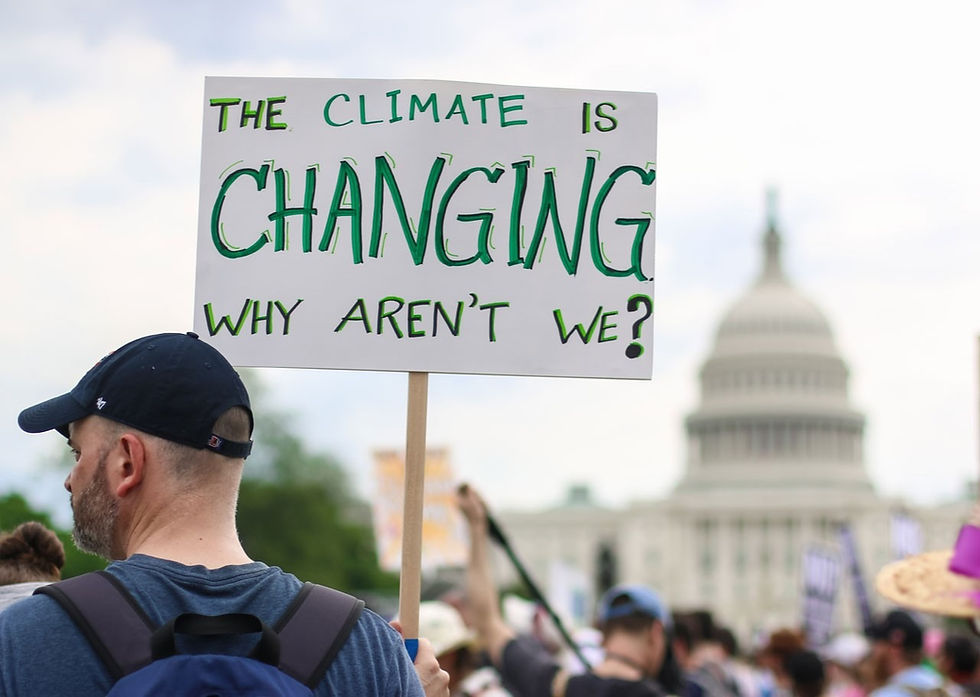U.S. climate action: A crisis of leadership
Yesterday, I wrote here about the new IPCC report and its dire predictions if we do not take ambitious action on climate change mitigation and adaptation. Achieving this change will require concerted efforts led by government. "Enabling conditions are key for implementing, accelerating and sustaining adaptation in human systems and ecosystems", said the IPCC. "These include political commitment and follow-through, institutional frameworks, policies and instruments with clear goals and priorities, enhanced knowledge on impacts and solutions, mobilization of and access to adequate financial resources, monitoring and evaluation, and inclusive governance processes."

Here in the U.S., this kind of coordinated action should be headed by Congress. Yet this leadership has been slow to materialize. It's unsurprising, given the level of climate denial exhibited by our federal officials. According to a study from the Center for American Progress, there are 139 elected officials in the 117th Congress - 26% of the entire body - who refuse to acknowledge the scientific evidence of human-caused climate change. This includes 109 representatives (25% of the House) and 30 senators (30% of the Senate). This is clearly out of step with both the scientific community and the American public, for whom climate change is a clear and present danger that needs to be addressed.
As a result of climate denial and problematic corporate funding, Congress has declined to debate any meaningful climate legislation. The Build Back Better Act, which originally included $550 bn for carbon reduction efforts, died in the Sentate due to opposition from Joe Manchin, a key Democrat from coal-producing West Virginia.
Without Congressional action, President Biden has used his executive power to make what changes he can. In his early days in office, Biden recommitted the United States to the Paris Agreement, pledged to halve U.S. emissions by 2050, paused new leases for oil and gas drilling, cancelled permits for the Keystone XL pipeline, and installed serious climate leaders within his administration. While admirable, the durability of these actions is tenuous, as the Supreme Court may soon demonstrate as it hears a perfect case study this week.
West Virginia vs. the EPA is a case being brought by a collection of states and coal companies against the Environmental Protection Agency, an executive agency of the federal government. The plaintiffs of the case (West Virginia) believe the potential extent of the EPA's (and therefore, the executive branch's) regulatory control over the power sector under the Clean Air Act is unconstitutional, and want the court to limit these powers. To be clear, these regulations don't yet exist. But West Virginia wants to make sure they never materialize.
The potential outcomes of this case are being parsed by legal scholars more educated than I. But in a nutshell, here is why the court's ruling on this case is so critical: if the court rules on the side of West Virginia, it will effectively truncate the agency of Biden's executive branch, the one area of federal government currently seeking to address climate change. It will also affirm that large-scale climate regulation must be enacted through Congress, where the complete lack of climate leadership will almost guarantee that emissions go unchecked. And progress will be further delayed if a Republican majority takes over in the midterm election, as the Republican party contains a higher proportion of climate deniers who are unlikely to champion the issue.
As Congress sits on its hands and refuses to lead, the IPCC's report makes clear that the terrible cost of this inaction is growing by the day (UN Secretary General Antonio Guterres called the report an "atlas of human suffering and a damning indictment of failed climate leadership"). We need Congress to immediately enact climate legislation that puts the U.S. on a path towards a sustainable future . What's more, if the U.S. abdicates its leadership role on climate change, the entire planet will suffer. But there is this fundamental issue that we must address: Congress is failing us on climate change. Their actions do not match up with the will and interests of the people who elected them. Even if the court upholds the EPA's authority to regulate, it only acts as a brief brake on our collision with this inevitable wall.
Of course, voters can be distracted from long-term goals when the short-term going gets tough and they are not offered a vision of the future behind which they can align, and that's how many of these climate-denying representatives stay in elected seats. It may also be that the voters who need to exert a referendum on these representatives, aren't. The Environmental Voter Project estimates that 12 million environmentalists skipped the 2018 midterms. How might our representation look different if the people who are represented by Congress actually exercised their right to choose who represents them?
Readers, this is why it is so critically important to vote and to stay politically engaged. I will be watching eagerly for the Supreme Court's ruling this month. I encourage you to investigate the track record of your state's representatives, and see how they stack up on climate change. And if you'd like to recruit more environmentalists to become engaged voters, consider volunteering with the Environmental Voter Project. Whether the court's decision forces the issue now or whether it comes later, if we are to avert the crises predicted by the IPCC, we in the U.S. must address the failure of Congressional leadership.






Comentários